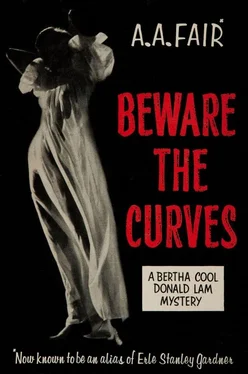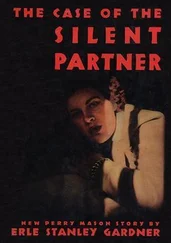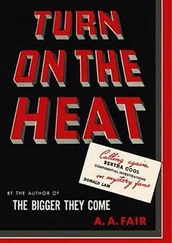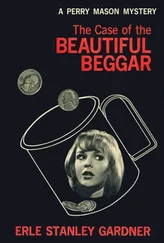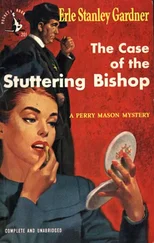“In what way?”
“The district attorney is not an unreasonable man. As it happens he is a friend of mine. I feel certain that he would be amenable to reason.”
“In what way?”
“I feel quite certain that if Ansel should plead guilty the district attorney would take into consideration the fact that a great deal of expense had been saved the county and no attempt would be made to try to get the judge to impose the death penalty. In fact, it might well be that the district attorney himself would ask for a life sentence. I am not in a position to state. I don’t represent the district attorney. I am only exploring the situation.”
“I see.”
“It might even be that Ansel could plead guilty to second-degree murder or manslaughter.”
I said, “I don’t think Mr. Quinn would be interested in such a deal. It is Mr. Quinn’s position that John Ansel is absolutely innocent.”
“That’s a completely cockeyed assumption. It disregards the cold, hard, evidentiary facts.”
“I’m not as yet too familiar with the facts,” I said. “We’re working on the case”
“Well, when you get familiar with the facts,” Taber said, getting to his feet, “you can get in touch with me. You can always find me in my office at Citrus Grove. And I may state that I’m always glad to do anything which will advance the economic interests of my fair city.”
“Then you’d better get busy with that zoning ordinance,” I said.
“What do you mean?”
“If five members of the Trustees got two thousand dollars apiece from Drude Nickerson,” I said, “it’s rather remarkable that someone would be that interested.
“Now,” I went on, “ I have a personal theory. My theory is that members of the Trustees each received two thousand dollars as a contribution to their campaign fund, but they didn’t receive it with the understanding that they were going to vote in favor of changing a zoning ordinance. I think they received the money with the understanding that Mr. Nickerson would be very, very happy to see the zoning ordinance remain unchanged so that the location of the new factory could be diverted to some property held by a friend of his.
“I can’t give you all the names as yet, but I hope to have them by this time tomorrow.”
“You’re working on this?” Taber asked.
“Certainly I’m working on it.”
“Professionally?”
I said, “I hope I’m not doing it amateurishly.”
“You could get into trouble over this thing, you know.”
“Sure, I could. So could a lot of other people. I wonder if Mr. Crosset reported the two thousand dollars that he received on his income tax.”
“You don’t have to report contributions made for campaign expenditures,” Taber said.
I grinned at him.
“At least, I don’t think you do,” he amended.
I kept on grinning.
Hale said, “We’ve done everything we can do here; Charles. We’ve offered to co-operate. The district attorney is my friend. I’m willing to do what I can, but I want people to meet me halfway.”
Taber nodded. “All right,” he said, “we just dropped in for a visit to get acquainted. We thought you should appreciate our position.”
“I’m damn certain you should appreciate ours,” I told him.
“You’ll hear from us again,” he said, and both men walked out without shaking hands.
When the door had closed, Bertha’s eyes were snapping cold light like the diamonds on her fingers.
“Donald,” she said, “what the hell are you trying to do? You’ve insulted those men. You’ve virtually made accusations of double-dealing.”
“Did it impress you that way?” I asked.
“It certainly did.”
“Then in all likelihood it impressed them the same way.”
“Do you have any idea what you’re talking about in this case?”
“Sure I do. Nickerson got fifteen grand from a Stella Karis. She wanted some zoning ordinances changed because there was a factory that wanted to locate on some of her land.
“Nickerson found out about it. Hale knew about it. Hale had some land that he wanted to lease to the factory. He didn’t want Stella Karis in the picture.
“So Hale decided to bribe the councilmen to sit tight and not change the zoning ordinance. However, Hale was constitutionally opposed to putting up any money, so he and Nickerson worked out a swell double cross by which they got Stella Karis to put up the money ostensibly for the purpose of influencing the council to grant the zoning ordinance, but Nickerson used that money as a bribe to get the city councilmen to leave the zoning ordinance the way it was.
“By the time the people of Citrus Grove get the idea that a big factory offering employment to thousands of men went elsewhere simply because some politician wanted to get in on the ground floor, it’s going to make quite a little—”
Bertha interrupted to say, “I hope the hell you know what you’re doing.”
“So do I,” I told her. “Public opinion is quite a thing when it gets aroused.”
“Well, you’re sure as hell arousing it. They say that people are gathered in little knots down in Citrus Grove, and aren’t talking about anything else — just the murder and the automobile factory.”
At three-thirty-five o’clock that afternoon the city council of Citrus Grove met in a special session and took steps to change the zoning ordinance so that the property belonging to Stella Karis was zoned for a manufacturing district.
With the passing of the ordinance, the Citrus Grove Clarion assured its readers that the industrial expansion for which the farsighted officials had been quietly campaigning during the last few weeks was assured.
Drude Nickerson remained “unavailable” for questioning.
Stella Karis telephoned twice while I was out. She left a message with Elsie Brand. Elsie Brand took it down in her shorthand book and relayed it to me when I came in. It was to the effect that Miss Karis had said she would like to see me, that she “simply couldn’t express her gratitude in words.”
I let it go at that.
A large part of the detective work in a murder trial consists of getting the backgrounds of the trial jurors. As soon as the case was set for trial, Bertha and I went to work on the venire from which the twelve jurors who were to try the case would be selected.
Bertha worked on the older men and the older women. I worked on the younger ones.
It was of course unethical and would have been a contempt of court to have talked with these people about the case, to have shadowed them so that they knew they were being shadowed, or to have engaged in any other activities that might be deemed to influence them.
However, there was no law against chatting casually with some of their friends or digging into the records and finding out where they had acted as jurors before, what kind of cases they were, and how they had voted.
It was a long tedious job but in the end we had a pretty good collection of condensed biographies.
Barney Quinn took these biographies and broke them down into short summaries. Then he took the short summaries and broke them down into an elaborate code. A short, straight mark at the top of a square opposite a prospective juror’s name meant he was honest and upright, but acceptable. If the mark leaned to the left, it meant he was so upright he’d lean over backwards. If the mark was down at the bottom of the square, it meant the man was obstinate, pigheaded and bigoted. If the mark was horizontal, it meant he would lie down when the going got tough.
In between times I’d keep checking on the facts.
Читать дальше
